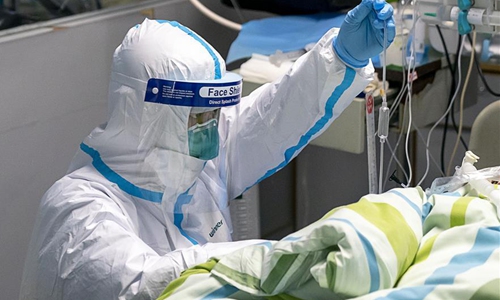
A medical worker gives a patient medical treatment in the ICU (intensive care unit) in Zhongnan Hospital of Wuhan University in Wuhan, central China's Hubei Province, Jan. 24, 2020. Photo: Xinhua
Plasma products containing antibodies to the novel coronavirus, which are believed to be the most effective treatment on COVID-19 patients in severe conditions at the current stage, will be promoted to more places, according to the chairman of the China National Biotec Group (CNBG), the country's largest biotech firm.
The products, which are made of donated plasma from recovered patients, have been used on 11 critical patients in Wuhan, Hubei Province, who improved apparently after receiving the treatment, Yang Xiaoming, chairman of the CNBG said at a press conference on Saturday in Beijing.
"We are using the treatment on another 12 critical patients," Yang said.
According to Yang, the group is actively promoting the treatment to critical patients in other places outside Hubei. A plasma collecting center is likely to be opened in Shanghai on Saturday.
Plasma products using plasma donated by recovered patients proved to be the most effective treatment for COVID-19 when there is no drug or vaccine available as of now, the CNBG announced on China's Twitter-like social media platform Sina Weibo on Thursday. These products can significantly lower the fatality rate among patients in severe conditions.
The news soon made headlines in China and became a trending topic on Weibo, bringing a glimmer of hope to Chinese people, who have been engulfed by the deadly epidemic for nearly two months.
As of Friday, 56,873 confirmed cases with 11,053 in severe conditions across China were reported. As of now, nearly 8,100 patients have recovered.
However, concerns remain over the supply, safety, and effectiveness of the plasma products.
Huang Bo, an immunology expert at the Chinese Academy of Medical Science & Peking Union Medical College, told media not every recovered patient's blood contains antibody-agent against the novel coronavirus, besides effectiveness of the antibodies, will be weakened if the plasma donated by different people are mixed to make the products.
Some other experts also warned that donors' plasma may contain other viruses, such as HBV and HIV.
In response to the doubts, Yang noted they have followed strict screenings to process the plasma.
Apart from routine tests, nearly 30 additional items will also be tested, including some common respiratory and intestinal bacteria as well as a pathogen to five kinds of infectious diseases like HIV, HBV, and syphilis, according to Yang.
Virus inactivation treatment will also be conducted to improve safety of the plasma products, Yang said.
As to the effectiveness, Yang said the titer of antibodies in the plasma materials they adopted is about 1:640. They will test the titer again after virus inactivation treatment on the plasma to ensure its effectiveness.
It takes at least a week from collecting plasma to prepare the products that can be used on COVID-19 patients. On average, one recovered patient can donate 400 milliliters of plasma to save 2-3 patients in severe conditions, according to Yang.
The CNBG has prepared plasma products enough for 70-80 severe patients, Yang said, noting that the products are now mostly used for emergency treatment due to limited supply.
CNBG and doctors in Wuhan have called on recovered patients to donate plasma. The group Saturday issued a second proposal calling for plasma donation.
"We need more plasma to save patients from suffering and help them fight for life!" read the proposal the group sent to the Global Times.
Zhang Dingyu, director of Jinyintan Hospital in Wuhan, a designated hospital for the treatment of COVID-19, urged recovered patients to donate blood during a press conference on Thursday.
"Four patients in our hospital have received blood oxygen stabilization after receiving the treatment and are in stable conditions ," Zhang said in an interview with China Central Television on Friday, noting that the treatment is beneficial for both medical researches and the patients.
According to Duan Kai, manager of CNBG Wuhan branch, more than 280 people have consulted them for blood donation and more than 20 recovered patients have volunteered to donate plasma as of Friday.




